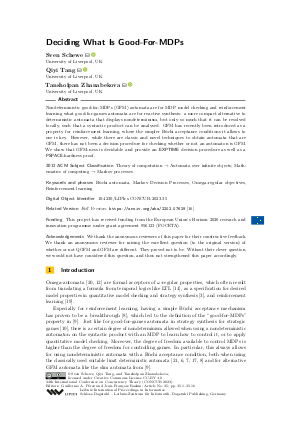@InProceedings{schewe_et_al:LIPIcs.CONCUR.2023.35,
author = {Schewe, Sven and Tang, Qiyi and Zhanabekova, Tansholpan},
title = {{Deciding What Is Good-For-MDPs}},
booktitle = {34th International Conference on Concurrency Theory (CONCUR 2023)},
pages = {35:1--35:16},
series = {Leibniz International Proceedings in Informatics (LIPIcs)},
ISBN = {978-3-95977-299-0},
ISSN = {1868-8969},
year = {2023},
volume = {279},
editor = {P\'{e}rez, Guillermo A. and Raskin, Jean-Fran\c{c}ois},
publisher = {Schloss Dagstuhl -- Leibniz-Zentrum f{\"u}r Informatik},
address = {Dagstuhl, Germany},
URL = {https://drops.dagstuhl.de/entities/document/10.4230/LIPIcs.CONCUR.2023.35},
URN = {urn:nbn:de:0030-drops-190290},
doi = {10.4230/LIPIcs.CONCUR.2023.35},
annote = {Keywords: B\"{u}chi automata, Markov Decision Processes, Omega-regular objectives, Reinforcement learning}
}

 Creative Commons Attribution 4.0 International license
Creative Commons Attribution 4.0 International license




















